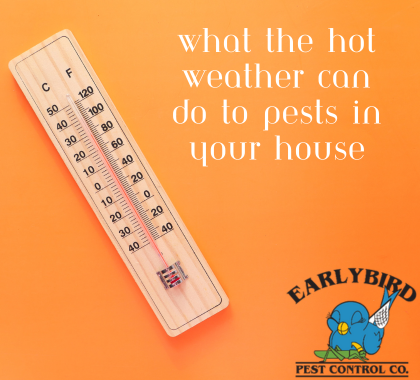Extreme heat can have a significant impact on the behavior, survival, and population dynamics of pests within your home. While pests are known to adapt to various environmental conditions, excessively hot weather can create challenging circumstances that affect their ability to thrive. In this chapter, we will explore the effects of hot weather on common household pests and how it can influence their behavior and presence in your home.
What Hot Weather can do to Pests
Increased Activity and Reproduction:
- Insects: Many household pests, such as cockroaches, ants, and flies, tend to thrive in warm environments. High temperatures can stimulate their activity levels, leading to increased foraging, reproduction, and population growth. Insect pests may also seek shelter in cooler areas of your home, such as basements or air-conditioned rooms, to escape the heat.
- Rodents: While rodents are more resilient to heat than insects, extreme temperatures can still impact their behavior. In hot weather, rodents may become more active during the night to avoid the scorching heat of the day. They might search for water sources more frequently, increasing the likelihood of their presence in your home.
Dehydration and Mortality:
- Insects: Prolonged exposure to high temperatures can lead to desiccation and dehydration in insects. They may struggle to find sufficient water sources, resulting in increased mortality rates. However, some insects have developed adaptive mechanisms to survive in dry environments, such as conserving water and burrowing deeper into cooler areas.
- Rodents: While rodents are generally more resistant to dehydration than insects, extreme heat can still impact their water requirements. If water sources become scarce, rodents may venture into residential areas in search of hydration, increasing the risk of infestation. However, excessive heat can also cause stress and mortality in rodents.
Altered Behavior and Migration:
- Insects: High temperatures can disrupt the normal behavioral patterns of insects. They may seek refuge in cooler areas or alter their foraging patterns to avoid direct sunlight. In some cases, hot weather can prompt insects to migrate to new locations in search of more favorable conditions, potentially leading them to infiltrate your home.
- Rodents: Similar to insects, rodents may alter their behavior in response to extreme heat. They may seek cooler areas within your home or relocate to more favorable outdoor environments, such as underground burrows or shaded areas. However, if your home offers a reliable food and water source, rodents may still attempt to access it despite the heat.
Increased Pest-Related Problems:
- Structural Damage: Extreme heat can exacerbate existing structural weaknesses in your home, providing pests with new entry points. Insects, such as termites, can exploit cracks or gaps in the foundation caused by the expansion and contraction of materials due to temperature fluctuations.
- Disease Transmission: Certain pests, such as mosquitoes and ticks, can transmit diseases to humans. Hot weather can create more favorable breeding conditions for these vectors, increasing the risk of disease transmission within your home and surrounding areas.
Hot weather can significantly influence the behavior, survival, and population dynamics of pests in your home. While some pests may become more active and reproduce rapidly, others may experience dehydration and altered behavior patterns. Understanding these effects can help you take proactive measures to mitigate pest-related issues during periods of extreme heat. Maintaining a clean and dry environment, sealing entry points, and ensuring proper ventilation can reduce the attractiveness of your home to pests and minimize their impact on your living space.
More Tips on Pest Control:
-
- 4 Signs You Have Bed Bugs
- How to Get Rid of Cockroaches
- How to Get Rid of Rats
- How Do I Know if I Have a Scorpion Infestation?
- How Do I Know if I Have a Bee or Wasp Nest in My House?
- How Do You Know if You Have Mice or Rats?
- Do I Need a Professional to Remove Tarantulas?
- 5 Ways to Keep Pests out of the Office
- How Ants Ruin your Home
- Can Pests Destroy Stucco?
- Pros and Cons of a Stucco Home
- Does Arizona Have a Cockroach Problem?


Recent Comments